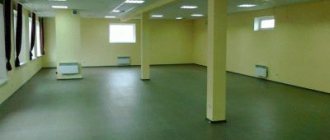What is it regulated by?
In 2021, utility fees (CS) and responsibility for paying them are regulated, first of all, by the Housing Code of the Russian Federation . Its provisions apply not only to residential areas, but also to non-residential premises in multi-apartment buildings (MKD). These are shops, offices and other establishments for which apartments, mainly located on the lower floors, are converted. Article 155 of the Housing Code is devoted to the issue of settlements with consumers.
Public access areas also serve as non-residential premises in apartment buildings: basements, attics, entrances, and so on. Payment of utility costs for their maintenance and repairs is distributed among the property owners.
The purpose of the property does not affect the obligations to pay contributions for major repairs, services of the RSO and MA, management organizations, contributions for major repairs - they apply to all owners of the house. We discussed in more detail the question of whether owners of non-residential premises should pay for major repairs in apartment buildings.
In addition to the Housing Code, payments in the field of utility services are regulated by part 6 of the Government of the Russian Federation of May 6, 2011 No. 354 (as amended on March 27, 2021). If the non-residential premises are located in a non-residential building, the provisions of the Housing Code do not apply to it , however, the owner of such real estate receiving utilities is obliged to pay for them according to the tariffs established in the region.
Owners of premises in non-residential buildings, unlike owners of real estate within an apartment building, are not required to make monthly contributions for major repairs.
By servicing the premises they own and the adjacent territory on their own, they also may not pay the MA for the maintenance of the building’s property common with other owners (if a document for the provision of such services has not been previously signed). Agreements for the maintenance of real estate, major and current repairs can be concluded with a local management organization or other contractor privately (we talked about how the owner of a non-residential premises can enter into an agreement for its maintenance with management organizations here).
of non-residential real estate within an apartment building are exempt from paying monthly contributions for major repairs
- consisting of less than four apartments, the owners of which themselves maintain the building and the surrounding area;
- where the exits from all apartments lead directly to the street (there are no entrances or other common area for several owners);
- designated for demolition;
- put into operation less than three to five years ago (depending on the region).
From January 1, 2021, in accordance with changes to RF PP No. 354, contracts directly with RNO must be concluded not only by the owners of real estate in non-residential buildings , but also by the owners of non-residential premises in apartment buildings. Previously, the provision of utilities for non-residential premises and their payment could be carried out through the intermediary of the management company in an apartment building. Now the contract with her is concluded only for the provision of services for the maintenance, carrying out current and major repairs of the building.
Law on payment for non-residential premises
Non-residential premises of an apartment building , as a general rule, include premises for commercial use: hairdressing salons, pharmacies, shops, which are located on the ground floor of the building. Payment for utilities that are provided in non-residential premises is the direct responsibility of their owners.
If common areas are converted into commercial use, then the overall percentage of MOP is reduced, which means the rent for residents is reduced.
The procedure for calculating services provided by housing and communal services has changed. Government Decree No. 354 of May 6, 2011 “On the provision of utility services to owners and users of premises in apartment buildings and residential buildings” states that each owner of non-residential premises in an apartment building is required to enter into an agreement with utility services . If previously payments for building maintenance could be made to the homeowners’ association, now this must be done directly to the housing and communal services.
Several agreements must be concluded with each organization, depending on what communications are carried out in non-residential premises. The new payment rules took property owners by surprise. If this agreement is not available, then the utility fee is calculated based on the data of the housing and communal services company.
Previously, consumers entered into agreements with management companies or with HOAs servicing an apartment building. Consumers unaware of the changes missed paying on time. Because of this, they incurred debts.
Please note: the payment document separates the amounts of payment for utilities for the premises owned and for common areas.
Making changes to the payment agreement
Homeowners' associations, management companies and housing cooperatives are responsible for informing both parties of the need to draw up an agreement. That is, to inform the consumer about changes in the payment procedure and about new obligations to the services that supply resources.
They must also inform the resource supplying organization about the availability of non-residential premises in the apartment building with communications installed.
The utility service provider must control the process of drawing up an agreement between the consumer and the supplier. Obligations to management companies existing before the changes are made lose their force.
Who transfers funds and how?
Responsibility for paying utility bills lies with the owner of the premises, regardless of its location.
If the premises are leased, by agreement between the parties, the tenant may undertake to pay utility costs independently, but the owner will continue to be responsible to the providers of services and resources.
Therefore, when concluding such an agreement, the lessor is recommended to regularly check whether bills from the MA and RSO are paid on time .
Each owner of non-residential premises is obliged to pay utility bills in full and on time. The amount of payment for consumed resources is determined by the indicators of individual metering devices. Services, the consumption of which is measured by a common house meter or is not recorded by metering devices at all (for example, housing maintenance, intercom maintenance), are paid in accordance with the footage of the property.
For owners of real estate in MKD, according to Article 155 of the Housing Code of the Russian Federation, there is a requirement to pay monthly fees for utilities by the 10th day of the month following the end. A different payment period may be determined by an individual agreement . To avoid incurring debts, you can transfer funds to service providers in advance.
What the Constitutional Court of the Russian Federation decided
The Constitutional Court of the Russian Federation decided that clauses 1, 3 and 7 of Art. 181.4, Art. 181.5 of the Civil Code of the Russian Federation and Part 1 of Art. 158 of the RF Housing Code do not contradict the Constitution of the Russian Federation, since the provisions they contain correspond to the current legal regulation of the Russian Federation:
- all owners of premises in an apartment building must participate in the costs of maintaining the public property in such a house;
- objective circumstances may serve as a basis for changing the share of participation of owners of a particular type of premises in the obligatory costs of maintaining public buildings in apartment buildings, provided that the differentiation of payment amounts does not entail unjustified differences in the legal status of owners of premises in apartment buildings belonging to the same categories;
- do not exclude the possibility that the court will invalidate the decision of the OSS.
Thus, the Constitutional Court of the Russian Federation recognized that tariffs for the maintenance of common property for residential and non-residential premises in apartment buildings may differ.
Contents and form of the agreement
Agreements for the provision of utility services are concluded by the owner of non-residential premises with the RSO and the managing management company (management company, homeowners' association, other forms of management). Such documents contain the conditions for the provision of services by the supplier, payment rules between the parties and their mutual responsibilities. The Responsibilities of the Parties section usually includes information about penalties for late payments.
The contract in question must consistently contain:
- Title of the document;
- place and date of signing;
- name, legal address, details and contact details of the service provider or resource;
- full name, date of birth, passport details, contact number of the consumer - individual or name, place of state registration and contact telephone number of the legal entity;
- the address and area of the facility to which the services will be directed, other information about the property that affects the calculation of the payment amount;
- name of the service provided, requirements for its quality;
- procedure for calculating the volume of resource consumed;
- data on installed metering devices, conditions for their inspections;
- the procedure for calculating payment, social support measures (if there are grounds for them);
- address for sending payment receipts;
- the procedure for checking the quality of services provided and actions in case of violations;
- rights and obligations of the performer and consumer;
- reasons and sequence of suspension of services;
- reasons and sequence of modification or termination of the agreement;
- validity period of the document;
- signatures of the parties.
An agreement for the provision of utility services does not require mandatory registration by government agencies, but, if necessary, can be used during legal proceedings.
Payments by owners of residential and non-residential premises in the house must meet the requirements of reasonableness
The Constitutional Court adopted a decision in the case of verifying the constitutionality of the provisions of Art. 181.4 and 181.5 of the Civil Code of the Russian Federation and Part 1 of Art. 158 Housing Code of the Russian Federation. According to the applicant, these legal provisions do not comply with the Constitution to the extent that they, without providing for a ban on the establishment by decision of a general meeting of owners of premises in an apartment building of differentiated rates of payment for the maintenance of common property depending on the purpose and location of the premises, prevent the court from declaring such decisions invalid .
The reason for the appeal was the following situation. By the court's decision, upheld by the appeal ruling, the applicant's right of ownership to a one-room apartment located in an apartment building was recognized on the basis of the agreement he had entered into for participation in shared construction. Prior to this, by the decision of the general meeting of owners and participants in shared construction, a partnership of real estate owners was determined as a method of managing this house and the amount of mandatory payments for premises owners was established: 25 rubles. from 1 sq. m of apartment, 10 rub. from 1 sq. m parking space and 14 rubles. from 1 sq. m of commercial space.
The applicant applied to the court with a demand to declare the decision of the general meeting invalid, but his demands were denied. The courts did not agree with the applicant’s arguments that the decision was made in violation of procedural norms and puts the owners of residential premises at a disadvantage compared to the owners of commercial premises, did not see any significant violations of the procedure for holding a general meeting and pointed out that the current legislation does not prohibit the establishment of a decision general meeting of differentiated rates of payment for the maintenance of common property depending on the purpose and location of the premises and a direct indication of the nullity of such decisions. The applicant was denied the transfer of the cassation appeal for consideration at the court session of the Judicial Collegium for Civil Cases of the Supreme Court of the Russian Federation.
Having considered the case, the Constitutional Court indicated that, according to its previously stated legal position of October 26, 2021 No. 2390-O, the fair distribution of necessary expenses between the owners of premises in an apartment building as participants in common property is ensured by Part 2 of Art. 39 of the Housing Code of the Russian Federation, which is in systematic connection with Art. 249 of the Civil Code of the Russian Federation and Part 1 of Art. 158 of the RF Housing Code enshrines the principle of compliance of the obligatory expenses of the owner of the premises with his share in the right of common ownership of common property. This is consistent with the provisions of Art. 19 of the Constitution of the Russian Federation, which does not imply, taking into account Part 1 of Art. 37 of the Housing Code of the Russian Federation arbitrarily determines the amount of payment for the maintenance of residential premises and contributions for major repairs. Accordingly, the imposition of expenses for the maintenance of common property in an apartment building not only on the owners of residential premises, but also on persons who own the non-residential premises located in it cannot be considered as inconsistent with constitutional requirements.
The Constitutional Court noted that with regard to decisions of the general meeting of owners, special regulation is contained in Chapter. 6 Housing Code of the Russian Federation. In particular, a decision made by a general meeting in violation of the requirements of the Housing Code of the Russian Federation can be appealed to the court by the owner of the premises if he did not take part in the meeting or voted against such a decision and if such a decision violated his rights and legitimate interests.
The Constitutional Court explained that the Housing Code of the Russian Federation does not contain special norms establishing the grounds for recognizing the decision of the general meeting of owners of premises in an apartment building as contestable or void, which allows the provisions of Chapter. 91 Civil Code of the Russian Federation. When assessing the legality of the appealed decision, the court should not be guided solely by the formal criterion of distribution of the burden of expenses for maintaining common property, established by Part 1 of Art. 158 Housing Code of the Russian Federation. At the same time, he has the right to recognize such a decision as invalid only if he comes to the conclusion that he has violated the requirements of the law.
Thus, the Constitutional Court of the Russian Federation concluded that the current legislation does not exclude the possibility of the general meeting of owners of premises in an apartment building taking into account when deciding on the amount of payments for the maintenance of premises and common property, the characteristics of the premises, as well as other objective circumstances that may serve as sufficient grounds for changing the share of participation of owners in mandatory expenses for the maintenance of common property.
Based on the above, the Constitutional Court of the Russian Federation recognized clauses 1, 3, 7 of Art. 181.4, Art. 181.5 of the Civil Code of the Russian Federation and Part 1 of Art. 158 of the RF Housing Code do not contradict the Constitution and indicated that the constitutional and legal meaning of these provisions identified in this resolution is generally binding. Proceedings in the case regarding the verification of the constitutionality of clauses 2, 4, 5 and 6 of Art. 181.4 of the Civil Code of the Russian Federation, terminated.
At the same time, the Court indicated that enforcement decisions against the applicant, if they were made on the basis of clauses 1, 3 and 7 of Art. 181.4, Art. 181.5 of the Civil Code of the Russian Federation and Part 1 of Art. 158 of the RF LC, in an interpretation that diverges from their constitutional and legal meaning identified in this resolution, are subject to revision in the prescribed manner, provided that there are no other obstacles to this.
Lawyer of the Confederation Law Firm Valentina Leonidchenko noted that this resolution of the Constitutional Court of the Russian Federation will serve as a guideline both for the owners of premises in an apartment building and for the courts, since it defines the circumstances taken into account when assessing the decision of the meeting for its legality (validity): good faith actions of meeting participants; absence of arbitrariness in setting the amount of payments and their reasonableness; objectivity, materiality and sufficiency of the criteria chosen by the meeting for differentiating rates; the absence of unfounded differences in the legal status of the owners of the premises after the adoption of the relevant decision of the meeting.
Anastasia Serova, a lawyer in the judicial practice of the law firm Eterna Law, noted that the decision of the Constitutional Court was made with certain restrictions for the owners of apartment buildings, who, unlike the owners of commercial premises, have fewer financial resources to maintain an apartment building. Thus, the owner of a non-residential premises, by renting out his premises or simply deriving income from commercial activities, receives significant financial resources compared to a citizen who is the owner of an apartment. “In this regard, a reduced rate for such an entity looks illogical,” the expert believes.
What is included in the CU?
Since 2021, owners of non-residential premises enter into contracts with the RSO directly , and not through the MA, so they receive several receipts from various organizations and pay for the following utilities:
- heat supply (only during the heating season);
- gas supply;
- power supply;
- hot and cold water supply;
- drainage (wastewater disposal);
- housing maintenance;
- intercom (if available).
You can find out how heating is organized in a non-residential building located in an apartment building and at what tariffs it must be paid during the heating season, and you can read about how the owner is obliged to pay for electricity here.
In 2021, contributions for major repairs are also present in the payment documents from the management authority and are required to be made by all owners of real estate in the apartment building (except for the cases described in paragraph 1).
Housing maintenance fees are the costs of services provided by the MA . First of all, they are borne by the owners of real estate in apartment buildings, however, the owner of premises in a non-residential building can also privately conclude an agreement with the management authority. Typically, the service includes maintenance and repair of public areas adjacent to the building, garbage removal, organization of inspections of the building by enterprises responsible for the life and health of citizens.
The payment for the maintenance of housing is proportional to the share of the owner of non-residential premises in the right of common ownership of the apartment building (Article 39 of the Housing Code of the Russian Federation).
Why did the decision of the OSS outrage the owner of the premises in the apartment building?
The General Meeting of Owners established different amounts of payments for the maintenance of common property in an apartment building for residential and non-residential premises.
The owner of the residential premises of this apartment building did not agree with this decision, believing that it was made in violation of procedural norms and puts the owners of residential premises at a disadvantage compared to the owners of non-residential premises.
He tried to challenge the OSS decision in court, but nothing worked. The district court and the judicial panel refused to satisfy the request to declare the decision of the general meeting invalid.
The courts justified this decision by the absence in the current legislation of a ban on the establishment of differentiated tariffs for the maintenance and repair of common property in apartment buildings, depending on the purpose and location of the premises.
Then there was the Supreme Court of the Russian Federation, which refused to consider the case to the owner. This became the reason for appealing to the Constitutional Court of the Russian Federation
Violation of the rules for the use of common property of the apartment building
151741
Mandatory expenses for general household needs
Common house needs (CHN) are the consumption of electricity, water, thermal energy, and drainage in order to maintain the condition and normal functioning of common property in apartment buildings (elevators, entrances, attics and other premises).
Previously, expenses for general house needs were listed on receipts from the management authority as a separate line . From 2021, they are included in the housing maintenance fee. Due to the payment by the owners of the ODN, the costs of lighting the staircase landings, operating the elevator, water for cleaning the stairs and its drainage, heating the entrances and other obligatory expenses are repaid.
In accordance with RF PP No. 354, all owners in the house are responsible for the costs of ODN; refusal to pay for them is impossible.
In 2021, the fee for one-way service cannot exceed established regional standards. The actual settlement with the RSO for ODN is carried out at the expense of the property owners by the managing authority. We talked in more detail about what is common property and how owners of non-residential premises should pay for one-time property in a separate article.
What does the owner give money for?
The owner of a non-residential premises pays for the consumed utility resources. In addition to these, the expenses of the owner of a non-residential property located in an apartment building include operating costs and expenses for general house needs.
The owner of non-residential premises is obliged to pay the costs of major repairs of the common property of the apartment building (Article 158 of the Housing Code of the Russian Federation).
Utility resources include heat, gas, water supply, sewerage and electricity supply. The supply of resources occurs under contracts that the owner of the premises must conclude directly with the resource supplying organization. Find out more about the specifics of setting tariffs and calculating payments for electricity and heating.
According to paragraph 69 of Resolution 354, the payment document must indicate:
- Address of the object;
- payer's details (full name for individual entrepreneurs, name for legal entities, bank details, place of registration);
- list of services subject to payment, month of payment;
- the volume of consumption of each type of resource for the period and the amount of payment;
- information about recalculations;
- information about deferment or installment plan (if provided for in the contract);
- other information.
We do not recommend completing the documents yourself. Save time - contact our lawyers by phone:
8 (800) 302-76-94Moscow
Where and how to pay?
Payment of utility bills by owners of non-residential premises is carried out on the same principle as by owners of residential premises. The difference lies in the absence of mediation by the MA in settlements with the RSO.
To make a payment, you need to know:
- name, address, tax identification number, payment details of the service provider company;
- name and volume of utilities received;
- contact and personal information of the payer (individual or legal entity);
- payment information about the premises (for example, personal account);
- payment period;
- information about benefits (if any);
- amount to be paid.
All this information is contained in receipts from service and resource providers.
You can fulfill your obligations to pay for the services of the MA and RSO using:
- cash desks of any financial institutions (banks);
- payment terminals;
- electronic payment systems;
- Internet banking (for plastic bank card holders);
- branches of the Russian Post.
On our resource there are other useful articles devoted to the rules for using non-residential premises in apartment buildings, as well as the nuances of their maintenance:
- Maintenance of such real estate and what communications can be provided?
- How to connect the Internet and other communications?
- How to conclude an agreement with a cleaning lady?
- Owner's procedure in case of flooding.
Who makes payments and how?
According to paragraph 65 of Chapter. 6 of Resolution 354, the consumer of services can independently pay for them, or can instruct other persons to pay by any means that do not contradict the requirements of legislative acts and the concluded agreement.
If the owner of the premises provides it for rent, then responsibility for paying for housing and communal services still remains with the owner of the property.
You can pay expenses immediately, or you can pay them in installments, but you cannot violate the deadline for payment of utilities established by the contract. The consumer has the right to make prepayments for future billing periods.






